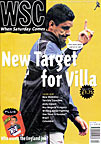 Kevin Keegan is not alone in trying to run a national team while holding down a club job. Adriaan Grijns recounts a similar experiment in Brazil
Kevin Keegan is not alone in trying to run a national team while holding down a club job. Adriaan Grijns recounts a similar experiment in Brazil
Wanderley Luxemburgo is an arrogant man. He once walked off the pitch with his team winning 1-0 and five minutes left. Wanderley, as he is referred to here, is the acclaimed new manager of the Brazilian national team, the Seleção.
Always charming and smartly dressed, he lost some of his cool when he was sent off by a referee during a match last November and subsequently suspended from managing his former team, Corinthians, the club with the biggest popular support in São Paulo. This was only one of the signs of tension in the period when Wanderley tried to combine building a new Brazilian national side with steering Corinthians past the last obstacles of the Brazilian championship.
Wanderley is not known for his conciliatory attitude. His vanity collides with strong egos. Enfants terribles Edmundo and Romário have been given something to think about. Although Wanderley confirmed that Rómario is “always an option”, everyone remembers that when together at Flamengo, the two did not get on. Romário won and Wanderley left. Flamengo haven’t won a thing since. Wanderley, meanwhile, won titles with Palmeiras, Novorizontino, Bragantino and lastly Corinthians, all São Paulo teams.
Although a native of Rio himself, proudly parading in the carnival, Wanderley is considered a Paulista in football terms. His appointment may have been pushed by São Paulo media and football bosses who were fed up with hearing that almost all successful managers of the Seleção have been Rio men. São Paulo currently has the money and the better football, while the game in Rio suffers from lack of organisation and personal feuds.
Brazil have so far won two and drawn one out of three friendlies played under the new coach, who has announced that the Seleção will be based on players from the domestic league. He started by picking some of his Corinthians protégés like Vampeta, the skinny midfielder with the bizarre nickname, a contraction of vampiro and capeta (devil). Formerly an invisible substitute for PSV Eindhoven, but now apparently attractive enough to pose for a gay review, Vampeta and his fellow team-mates Indio and Marcelinho Carioca were to give the new team a boost.
First victims were Ecuador in an absurd match in Washington. The Ecuadorian press had implored their football association not to send a squad as there would not be 11 decent players available: “It will be the nation’s biggest embarrassment ever”. The players complied with this prediction and went down 6-1, three of the goals down to terrible mistakes by the goalkeeper. Another theatre show was the good-humoured 5-1 thrashing of a Russian team suffering from a 45-degree temperature difference and looking paler than the neon lighting in far Fortaleza. In between came a 1-1 draw against Yugoslavia.
No doubt Wanderley was right to pick eager, inexperienced players, even from his own club: the preference for home players was widely approved of at home, where the disappointing World Cup result was mostly blamed on the European-based stars.
Since then, Wanderley has left Corinthians. His contract, however, has only been suspended, albeit for financial reasons.Their first performance without him was a 6-1 defeat, so the bank that sponsored his contract may want him back in the future. For the time being, Wanderley will dedicate himself to the Seleção.The squad’s next trips will be South Korea and Japan, the latter preparing itself for an unconventional guest appearance in the Copa “America” this summer in Paraguay.
Wanderley claims to have waited his entire career for the honour of coaching the Seleção. The question is, of course, how his character will match up to those capricious and egoistic players who, after all, always make the difference between Brazil and the other teams. Asked recently what Brazil’s greatest weakness is, France’s Aimé Jacquet replied: “They are amateurs”. It is this frivolity that Wanderley envisages tackling by imposing a strong discipline on the team, to militarise them, some say.
History shows the purely creative teams of the past were seldom successful. Mario Zagallo relied on a combination of talented individuals but won matches in France which the team could have equally lost (and vice versa). Carlos Alberto Parreira, the USA 94 coach, launched a well-organised team with an iron defence, and kept out of confrontations with “difficult” players.
Wanderley also believes in organisation but with a more attractive touch. “We should play like the Netherlands in France 98, aggressive and with teamwork.” The objective may seem quite challenging. Johan Cruyff said in France that “Brazilian football has always been the total opposite of Dutch football”. But Wanderley has already made preparations: three friendlies against the Dutch have already been scheduled for this year.
From WSC 146 April 1999. What was happening this month